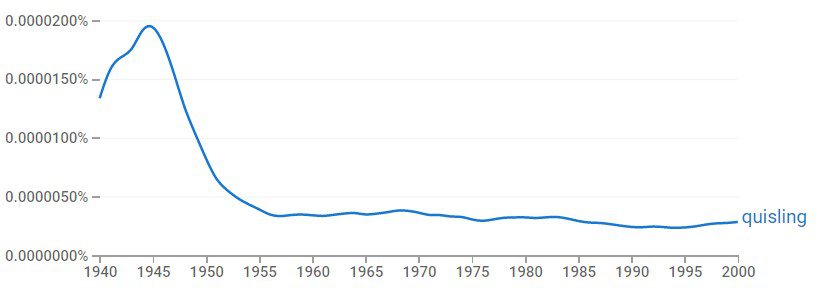Vidkun Quisling was a Norwegian politician who, in collaboration with the Nazis, seized leadership of Norway in 1940 and worked with the German occupiers until the end of the war. From the beginning of his reign, his name was widely used to refer to a traitor, especially one who openly collaborates with an occupying force. The word was so useful that it was almost immediately decapitalized—to make quisling—and various derivatives, such as quislings, quisle, and quislingism, soon developed.
Quisling still appears today, albeit rarely. The reference is probably lost on many 21st-century English speakers, and the word might be too rare to survive much longer.
The below ngram graphs the use of quisling in a large number of English-language texts published between 1940 and 2019. It suggests that the word has done surprisingly well since its peak during Quisling’s rein. Though its use appears to be down over the last few decades, it is steady:

Examples
Historical
If the sound of it reached Berlin, it appears doubtful whether the representative of Hitler-in-the-home will be able to quisle his way out of this one. [Vancouver Sun (1941)]
Greek Quislings are getting scared by the Allies’ victories. The Quisling Premier Tholakoglu has resigned. The Germans have found another Quisling who is related by marriage to Nazi Field Marshal List. [Ottawa Citizen (1942)]
We were learning that we not only had to fear quislings or semi-quislings—striped ones we called them—but also those careless friends of ours who couldn’t hold their tongues. [1943 article by a Norwegian dissident, published in New York Times]
Railway stations are reported packed with German evacuees and French quislings leaving Paris. [Milwaukee Journal, 1944]
Recent
Instead, they say the United States and Israel, allied with certain quisling Arab governments, are plotting to destroy Syria. [New York Times]
The Sunni Arab members of the committee are not stooges or quislings; their endorsement would encourage a much bigger turnout in the referendum and in the subsequent general election. [Economist]
Mr MacPherson has risen to the presidency of the Southland Feds because his predecessor, Hugh Gardyne, was deemed a quisling for supporting the new rule. [Southland Times]
Comments are closed.